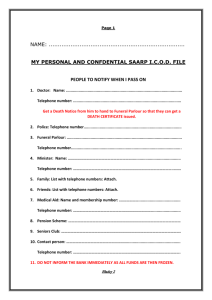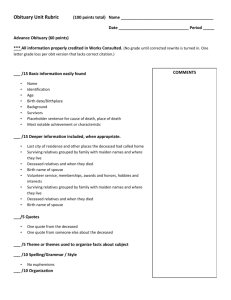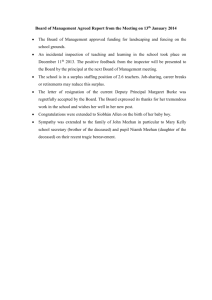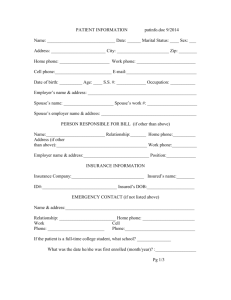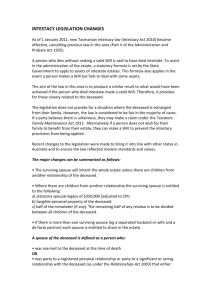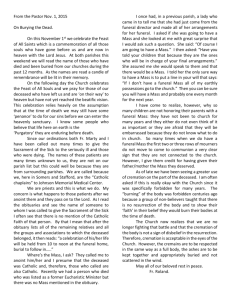doc - Citizens Information Board
advertisement
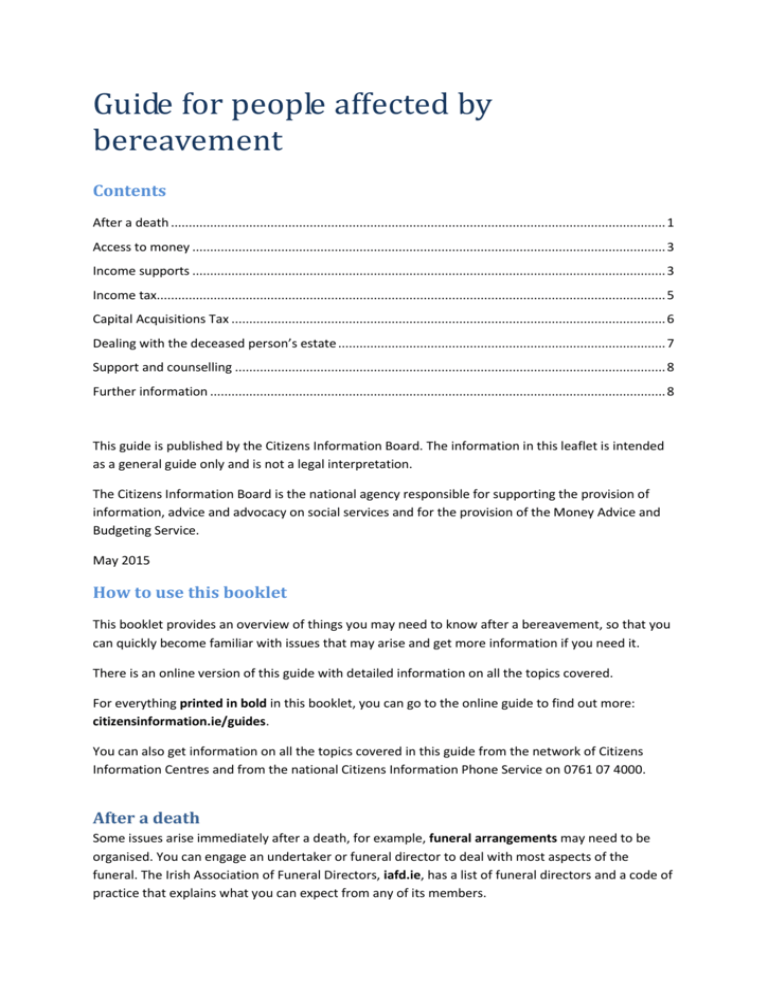
Guide for people affected by bereavement Contents After a death ........................................................................................................................................... 1 Access to money ..................................................................................................................................... 3 Income supports ..................................................................................................................................... 3 Income tax............................................................................................................................................... 5 Capital Acquisitions Tax .......................................................................................................................... 6 Dealing with the deceased person’s estate ............................................................................................ 7 Support and counselling ......................................................................................................................... 8 Further information ................................................................................................................................ 8 This guide is published by the Citizens Information Board. The information in this leaflet is intended as a general guide only and is not a legal interpretation. The Citizens Information Board is the national agency responsible for supporting the provision of information, advice and advocacy on social services and for the provision of the Money Advice and Budgeting Service. May 2015 How to use this booklet This booklet provides an overview of things you may need to know after a bereavement, so that you can quickly become familiar with issues that may arise and get more information if you need it. There is an online version of this guide with detailed information on all the topics covered. For everything printed in bold in this booklet, you can go to the online guide to find out more: citizensinformation.ie/guides. You can also get information on all the topics covered in this guide from the network of Citizens Information Centres and from the national Citizens Information Phone Service on 0761 07 4000. After a death Some issues arise immediately after a death, for example, funeral arrangements may need to be organised. You can engage an undertaker or funeral director to deal with most aspects of the funeral. The Irish Association of Funeral Directors, iafd.ie, has a list of funeral directors and a code of practice that explains what you can expect from any of its members. Registering the death should be done as soon as possible and no later than three months after the death. It is usually done by the next of kin. Alternatively, it may be registered by a person who was present during the death or final illness, by a near neighbour or, failing that, by the undertaker. You will need a Death Notification Form stating the cause of death. You can get this from the doctor who attended the deceased during their last illness. When you register the death, you can get a Death Certificate from the Registrar of Births, Deaths and Marriages at the same time. In certain cases of sudden or unexplained death, the Coroner may investigate the cause. If the cause of death is not clear, a postmortem examination (sometimes called an autopsy) may be carried out. If this does not explain the death, an inquest may be held. The majority of deaths occur in hospital. In some cases a decision about organ donation may need to be made. Most hospitals have mortuaries where the body of the deceased may be held until the funeral arrangements are made. You may decide to take the body home or have the remains brought to a funeral home. In the case of a death abroad, Irish embassies and consulates provide help in connection with the deaths of Irish citizens and with making arrangements for the return of the remains to Ireland. A list of Irish embassies and consulates is available at dfa.ie. An undertaker here in Ireland should also be able to help you deal with the formalities and arrangements required and help find a suitable funeral director in the other country. Repatriation of the remains of a deceased person to Ireland can be a complicated and costly process. You may wish to consider having the body cremated abroad and having the ashes returned to Ireland. If the bereaved include orphans under the age of 18 years, immediate arrangements have to be made for them. Generally, family members take care of orphaned children until long-term arrangements are made. If there are no family members to do this, the Child and Family Agency (also called Tusla) needs to be informed and it will make arrangements to care for the children. The death of a baby can be very difficult and there are supports available if you are affected by miscarriage, stillbirth or neonatal death. In cases where a serious road traffic accident causes a fatal injury, there will be an investigation by the Gardaí and possibly the Coroner. It may involve an inquest and even a criminal prosecution. PARC Road Safety Group has published a guide for victims called Finding your way, available at parcroadsafety.ie. If the deceased died as a result of a crime, you may be dealing with the criminal justice system as a victim of crime. You may be able to claim compensation from the Criminal Injuries Compensation Tribunal. AdVIC (Advocates for Victims of Homicide) is a voluntary organisation which supports families bereaved by homicide. Crime Victims Helpline provides information and support to victims of crime and those affected by crime: call Freephone 116 006. Access to money There are situations where a bereaved person may need to get access to some of the money left by the person who died, for example, to pay for funeral expenses. A dependent spouse, partner or child may, for example, need to get access to cover living expenses until they can get a social welfare payment. How you can access money depends on the type of account. It is not easy to get immediate access to the deceased person's money unless it is in a joint account. If the account is in the name of the deceased only, you usually cannot get access to it until probate is taken out (see Dealing with the deceased person’s estate below). If the money is in a credit union or post office savings account, the account holder may have nominated a person who should receive it after their death. Also, the person who died may have had an insurance policy or pension which pays an amount to specified people after death. If the deceased was getting a social welfare payment , their spouse, civil partner or cohabitant may be able to continue to get the social welfare payment for six weeks after the death. If household bills are in the deceased’s name you can arrange to have them put into your name. If the bills were paid by standing order or direct debit from the deceased’s bank account you may need to inform the bank to cancel them. You may need to cancel any credit or debit cards of the person who died. You may also need to cancel their health, car or home insurance. An Post provides a mail redirection service. You will need to provide documentary proof of entitlement to receive the post of the deceased person. For personal loans, you are only liable for those debts for which you have signed. If you are having difficulty making repayments on a loan, you should let the company know what has happened and ask for time to work out what you can actually afford, given your changed circumstances. If you are asked to take over the payments on a loan that is in the sole name of the deceased, you are not legally obliged to do so as this should be paid out of the estate – seek advice if you are not sure what to do. If you are experiencing financial difficulties following a bereavement, you can get advice from your local Money Advice and Budgeting Service (MABS). Contact details are available in your local telephone directory or at mabs.ie. FLAC runs a network of part-time free legal advice clinics throughout the country and a telephone information and referral line, Lo-call: 1890 350 250. Details of clinics are available through your local Citizens Information Service, see centres.citizensinformation.ie. Income supports If the person who died was getting a social welfare payment, or if you were claiming for them as a dependant or you were getting a Carer's Allowance to look after them, it is important to notify the Department of Social Protection soon after the death. Notifying the Department does not mean the payment will be taken back immediately. In many cases, the spouse, civil partner, cohabitant, parent or carer may continue to receive a payment for six weeks following the death. After a bereavement you may need financial support. The Department of Social Protection provides certain payments to help families during this difficult time. For some social welfare payments you must have paid enough Pay Related Social Insurance (PRSI) contributions to qualify. Other payments have a means test and whether you qualify depends on your income. Widow’s, Widower’s or Surviving Civil Partner’s (Contributory) Pension is a weekly payment to the spouse or civil partner of a person who has died. Either you or your late spouse or civil partner must have enough PRSI contributions to qualify. At the age of 66 your payment increases to the State Pension (Contributory) rate. Widow’s, Widower’s or Surviving Civil Partner’s (Non-Contributory) Pension is a means-tested payment for widows, widowers or surviving civil partners aged under 66 without dependent children who do not qualify for the Widow’s, Widower’s or Surviving Civil Partner’s (Contributory) Pension. You must satisfy the habitual residence condition and you must not be cohabiting. At the age of 66 you transfer to the State Pension (Non-Contributory). If either you or your late spouse or civil partner was insurably employed in a country covered by EU regulations or a country with which Ireland has a bilateral social security agreement, you may be entitled to a payment from that country. Alternatively, it may be possible to qualify for a contributory pension in Ireland using social security contributions paid in another country. If you have a dependent child, you can apply for the One-Parent Family Payment (OFP) which is a means-tested payment. If you apply because you are parenting alone due to the death of your spouse, partner or civil partner, you may get OFP for up to 2 years from the date of death, provided your youngest child is aged under 18. (Usually, OFP lasts until the youngest child is 7 years old.) The Widowed or Surviving Civil Partner Grant is a once-off payment to widows, widowers or surviving civil partners with dependent children. You may qualify for this grant if you are eligible for certain social welfare payments. If you are taking care of an orphan you may get a guardian’s payment. Entitlement to the Guardian’s Payment (Contributory) depends on the PRSI contributions of a parent or step-parent. The Guardian’s Payment (Non-Contributory) is granted on the basis of a means test of the orphan’s means. If an orphan is attending a full-time education course, is aged between 18 and 22 years and is not living with or in the care of a guardian, the guardian’s payment can be paid directly to the orphan. If your spouse or civil partner died as a result of an accident at work (or travelling to or from work), or from an occupational disease, or was getting a Disablement Pension assessed at 50% or more, you may be entitled to Death Benefits under the Occupational Injuries Benefit (OIB) Scheme. These include a Special Funeral Grant and a Widow’s, Widower’s or Surviving Civil Partner’s Pension. If the deceased was parenting or supporting a child, the child may qualify for a Guardian’s Payment under the OIB Scheme. The Bereavement Grant to help with funeral costs was ended in 2014. There are other social welfare benefits and payments which you may be able to claim, depending on your circumstances. The Supplementary Welfare Allowance Scheme includes a weekly allowance for people who have little or no income, as well as an Exceptional Needs Payment for people who can’t afford essential, once-off, exceptional expenditure, such as funeral costs. The Living Alone Increase is a weekly payment for people receiving certain social welfare payments who are living alone. The Household Benefits Package is a package of allowances to help with the costs of running your household. The Fuel Allowance is a payment to help with the cost of heating your home during the winter months. It is paid to people who are dependent on long-term social welfare and who are unable to provide for their own heating needs. The Free Travel Pass allows the holder to travel free on public transport and some private transport services in Ireland. Treatment Benefit includes Dental Benefit, Optical Benefit and hearing aids. Entitlement is based on PRSI contributions. If you are dependent on a spouse or civil partner who dies when over the age of 60 and eligible for Treatment Benefit, you will continue to be eligible while you remain widowed or a surviving civil partner. Income tax There are special arrangements for income tax in the year of death and there are some tax credits and allowances which are particularly relevant to people who have been bereaved. There are specific rules about how taxation is applied to income in the year of death. The tax treatment varies depending on the circumstances of the deceased. In the year of the death of a single or widowed person, the normal tax credits for the whole year apply. This means that a refund may be due and may be claimed by the personal representatives of the deceased (see page 8). The refund becomes part of the deceased’s estate. There are different ways in which spouses or civil partners can be assessed for tax and this will affect how someone is taxed in the year of death of a spouse or civil partner. If you were both taxed as single persons then the Widowed Person or Surviving Civil Partner Tax Credit will replace the personal tax credit you had at the start of the year. This is also the case if you were taxed under separate assessment but in this case you may also be entitled to unused tax credits that were allocated to your spouse or civil partner. If you are jointly assessed for tax, then how you are taxed depends on which of you was the assessable person, usually the higher income earner unless you choose otherwise. If you are the assessable person and your spouse or civil partner dies, you are taxed in the normal way – you are taxed on your own income for the full year and on the income of your spouse or civil partner up to the date of death. You are entitled to the normal tax credits including any PAYE credit to which your spouse or civil partner may have been entitled. If your spouse or civil partner was the assessable person, then from the date of their death you get the Widowed Person or Surviving Civil Partner Tax Credit and the PAYE credit (if you are eligible). The tax bands for a single/widowed person apply. For the rest of the tax year before the date of death, the full Married Person or Civil Partner Tax Credit applies and the PAYE credit (if you are eligible). The tax bands for a married couple or civil partners apply. The Married Person or Civil Partner Tax Credit applies to widowed people in the year of bereavement whether or not they have children. Each year following the year of bereavement you will get the Widowed Person or Surviving Civil Partner Tax Credit. There are additional tax credits for widowed people with dependent children in the years after the year of bereavement. These are the Widowed Person or Surviving Civil Partner's (with dependent children) Tax Credit and a Single Person Child Carer Credit. There is also an additional tax credit for the first five years after the year of death, called the Widowed Parent or Surviving Civil Partner Tax Credit. Capital Acquisitions Tax If you receive a gift, you may have to pay Gift Tax on it. If you receive an inheritance following a death, it may be liable to Inheritance Tax. Both these taxes are types of Capital Acquisitions Tax (CAT). Both taxes are payable by the person who receives the gift or inheritance. Whether or not tax is payable depends on the value of the gift or inheritance and the relationship between the giver and the receiver. If you receive a gift or inheritance from your spouse or civil partner, you do not have to pay Capital Acquisitions Tax. There are three different categories with different limits to the amount you can receive before you become liable for tax. The highest threshold is for group A which applies to gifts or inheritances given by parents to their children. In very limited and specific circumstances it may also apply to gifts or inheritances given to a grandchild, nephew or niece, or to an inheritance received by a parent. Group B applies to most gifts or inheritances given to a grandchild, parent, nephew or niece. It also applies to gifts or inheritances given to brothers or sisters and to grandparents and greatgrandchildren. Group C has the lowest threshold and applies to any relationship not included in Group A or Group B. For each category, any gift or inheritance since 5 December 1991 counts towards the limit. The first €3,000 of the total value of all gifts received from one person in any calendar year is exempt. This does not apply to inheritances. If you receive a gift or inheritance from a relation of your deceased spouse or civil partner, you can be assessed under the same group as your spouse or civil partner would be if they received the benefit from their relation. CAT is subject to self-assessment. This means that you must declare your gifts and inheritances and assess the amount of tax payable yourself. You may, of course, get professional help to do this. Under certain circumstances, there is no CAT on an inheritance of a family home. This is the case if you are the spouse or civil partner of the deceased but it is also the case if the house was your principal private residence and you do not have an interest in any other residential property. To qualify for this dwelling house tax exemption there are conditions on how long you must be resident in the house before and after receiving the benefit. For further information on Capital Acquisitions Tax see citizensinformation.ie. Dealing with the deceased person’s estate If there is a will, then the executor needs to take out probate. This means having the Probate Office certify that the will is valid and matters are in order. An executor is a person named in the will as being responsible for implementing the terms of the will. The assets are distributed in accordance with the terms of the will. The inheritance rights of a spouse or civil partner mean that they may have an entitlement to a minimum legal right share of the assets even if this is not provided for in the will. The children do not have the same right but can apply to court if they feel they have not been adequately provided for in the will. The inheritance rights of cohabiting couples don’t include any automatic entitlement. If you are in a cohabiting relationship and you die without a will, your partner has no right to any share of the estate no matter how long you have been together, apart from what was held jointly. A qualified cohabitant can apply to court for provision to be made from the estate. If a person dies without having made a will, or if the will is invalid for whatever reason, they are said to have died intestate. If there is no will, an administrator may be appointed, usually the next of kin or a lawyer, and the court issues a document known as a Letter of Administration. (This may also happen if there is a will but no executor.) There are rules for how assets are divided without a will, according to what relatives there are and their relationship to the deceased. Often the family home is held by a couple as joint tenants, in which case the surviving partner automatically inherits the deceased partner’s interest. It is also possible to own property as tenants in common. Tenants in common share property rights but may hold different parts of a property or unequal shares and each person’s share does not automatically become the property of the survivor. Such shares may be willed to the survivor or be willed to other people or be inherited according to the rules that apply if there is no will. The duties of executors and administrators (also known as the personal representatives) are broadly the same. If the estate is complex, it may be advisable to appoint a solicitor to do the job and they can be paid out of the estate. If matters are straightforward, the executor or administrator may decide to make a personal application for probate. If there are any debts, these must be paid out of the estate before anything else. Where there is not enough money in the estate to pay all outstanding bills or debts, those relating to the funeral, administration of the estate and the will take priority, followed by debts that have security (such as housing loans) and lastly unsecured debts (for example, personal loans). Some debts may be covered by loan protection insurance in the event of death (for example, credit union loans). Support and counselling Not everyone needs bereavement counselling. However, sometimes family, friends and those closest to you may be unable to help in the process of mourning, perhaps because they too are grieving or because you may not want to talk to someone you know about the feelings you have. Bereavement counselling offers the opportunity to explore, understand and work through feelings of grief. Often, just getting reassurance can help. The Health Service Executive (HSE) has published a book about grief and bereavement for people who are grieving and for those who are supporting them. Bereavement – When Someone Close Dies can be downloaded or ordered at healthpromotion.ie. The HSE has also published a directory of counselling and other bereavement support services. You Are Not Alone – Directory of Bereavement Support Services is available for download at healthpromotion.ie. Further information Online You can get more information on any of the topics covered in this booklet at citizensinformation.ie. For an online version of this guide with links to detailed information for all the topics printed in bold go to citizensinformation.ie/guides. Citizens Information Phone Service If you have questions about any of the information covered in this booklet you can contact the Citizens Information Phone Service at 0761 07 4000, Monday to Friday 9am to 8pm. Citizens Information Centres You can visit your local Citizens Information Centre for information and advice. Find your nearest centre at centres.citizensinformation.ie. Money Advice and Budgeting Service (MABS) The Money Advice and Budgeting Service is a free, confidential service for people in debt or who are at risk of getting into debt. You can contact the MABS Helpline on 0761 07 2000, Monday to Friday, 9am to 8pm.
